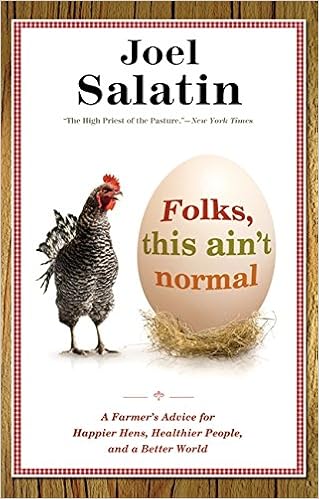
This is a wonderful book, filled with interesting knowledge and a philosophy of how food should be grown. I have to admit that, as far as I'm concerned, he is preaching to the choir. Yet, there are several things about the book that bother me, especially a conflict between the principles of the first half and the second.
This is not a book about how to do farming, although the attentive reader would pick up many good points. It is more about a philosophy of self-sufficiency and using nature rather than battling it. The first part of the book handles that very well. Basically, the author contrasts the way food is raised on a "traditional" but well managed nature-embracing farm and the way food is produced in the industrial approach to raising vegetables and meat. Needless to say, he illustrates the horror and unhealthy results of the latter. He also makes excellent points as to the true costs of our over-subsidized industrial agriculture - particularly with respect to energy consumption.
Along the way he illustrates how the farm life, lived his way, creates emotional strength and satisfaction for the farmer and creates children who are happy, confident, realistic and responsible. He does a great job of selling this approach to self-sufficiency and community stability. My only problem with some of his methods is a health worry. He is big on pasturing both cattle and hogs (and having chickens follow them around). In fact the hogs go rooting in the forest, to the forest's benefit.
I believe all this, but I worry about the possible downside -- parasites. I wince when I watch TV and see the feral hog hunters eating the pork they catch. I have to believe parasites are a problem when the meat producing livestock just wander through nature. On the other hand, industrial meat (and vegetables) may be free of parasites, but they create a number of anti-biotic resistant mutant microbes and viruses, not to mention the steroids and other unnatural chemicals we eat.
Now, after this bucolic picture of farm life revealed in the first half, the author gets to another area. He talks about the conflict between the industrial food producers and the "little guy." There he reveals that he isn't all that little. He would appear to be relatively wealthy from his writings. His home farm is 550 acres and he rents several others. He wants to sell his produce far and wide. To me this seems inconsistent with enjoying a natural self-sufficient life on your own land. He wants to be a mini-industrialist. This bothered me.
Nevertheless, he makes terrific points about the idiocies and hidden agendas of government regulation. He appears shocked to realize that the regulations are not so much to protect the consumer (despite support from "consumer advocacy" groups), but rather to protect the big producers from competition. I'm not shocked. I'm old enough to remember numerous times when a free-market-loving industry is confronted with upstart competition that it runs to its well-paid politicians for protection and relief. This is nothing new. But, it is bad. Of course the shock of actually going to free markets is something no politician would really like to see.
He makes a good point about trying out new regulatory schemes on a small limited scale to see the real effect before rolling them out to cover everyone. That's something business has always known, and government never. However, I think he, like Milton Freeman, embraces the free market concept but is pretty naïve about how one gets rid of the bad actors. True, in small areas of society where everyone knows everyone else the word can get around and the bad actors decimated. That's not so easy in our population-crammed society. He thinks one solution is that we all just have contractual relations with no limits on what we can agree to. That could work if we were all equal, but we're not.
Amusingly, he absolutely hates lawyers for good reasons (and I am a recovering lawyer), yet in this land of free contracts he would have things done by "arbitration." He needs to think this through more thoroughly. Just an aside - He thinks our politicians and judges should come more from the common people and not the lawyer class. Actually, we used to do that. My first law case was before a non-lawyer judge, the last one in Missouri. He was terrific, although I lost the case. Also, Harry Truman was a non-lawyer judge before going on to bigger things.
So, the bottom line is that I love the book, although I'm not sure I agree with all his ideas. The author, Joel Salatin, is very creative, articulate, and puts a lot of material in his books. He also includes some great excerpts from Benjamin Franklin and Thomas Jefferson. We should all meditate on these. This book will perhaps inspire you, definitely make you think, and maybe even act.
No comments:
Post a Comment